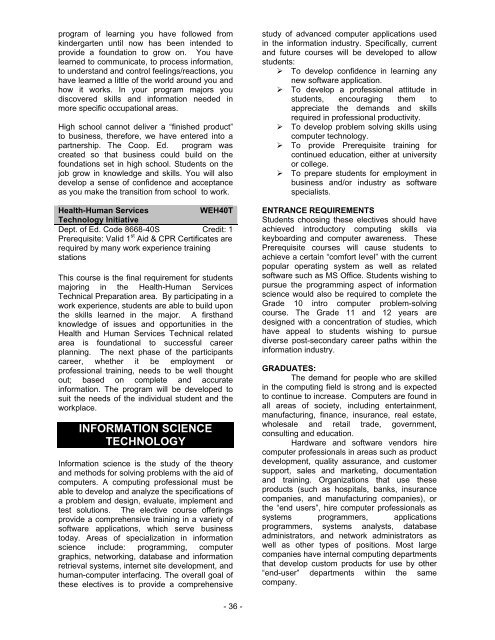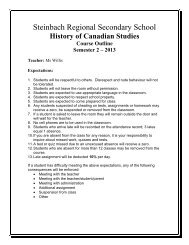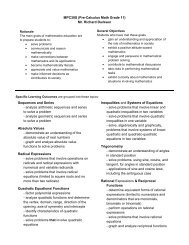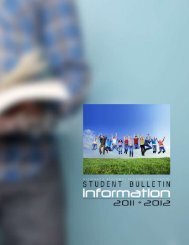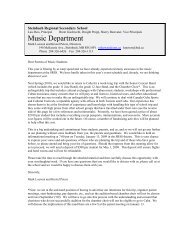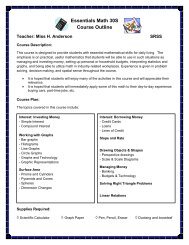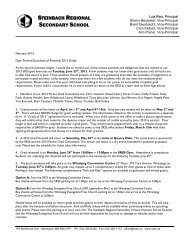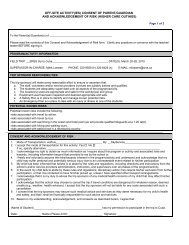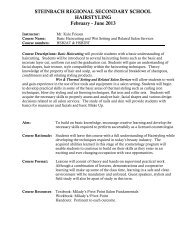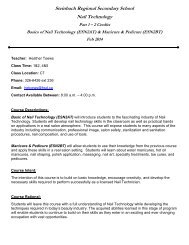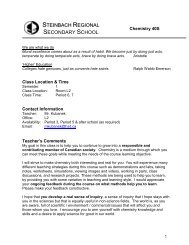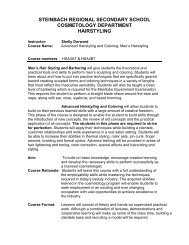SRSS Handbook 2012_13.pdf - Steinbach Regional Secondary ...
SRSS Handbook 2012_13.pdf - Steinbach Regional Secondary ...
SRSS Handbook 2012_13.pdf - Steinbach Regional Secondary ...
Create successful ePaper yourself
Turn your PDF publications into a flip-book with our unique Google optimized e-Paper software.
program of learning you have followed from<br />
kindergarten until now has been intended to<br />
provide a foundation to grow on. You have<br />
learned to communicate, to process information,<br />
to understand and control feelings/reactions, you<br />
have learned a little of the world around you and<br />
how it works. In your program majors you<br />
discovered skills and information needed in<br />
more specific occupational areas.<br />
High school cannot deliver a “finished product”<br />
to business, therefore, we have entered into a<br />
partnership. The Coop. Ed. program was<br />
created so that business could build on the<br />
foundations set in high school. Students on the<br />
job grow in knowledge and skills. You will also<br />
develop a sense of confidence and acceptance<br />
as you make the transition from school to work.<br />
Health-Human Services<br />
WEH40T<br />
Technology Initiative<br />
Dept. of Ed. Code 8668-40S Credit: 1<br />
Prerequisite: Valid 1 st Aid & CPR Certificates are<br />
required by many work experience training<br />
stations<br />
This course is the final requirement for students<br />
majoring in the Health-Human Services<br />
Technical Preparation area. By participating in a<br />
work experience, students are able to build upon<br />
the skills learned in the major. A firsthand<br />
knowledge of issues and opportunities in the<br />
Health and Human Services Technical related<br />
area is foundational to successful career<br />
planning. The next phase of the participants<br />
career, whether it be employment or<br />
professional training, needs to be well thought<br />
out; based on complete and accurate<br />
information. The program will be developed to<br />
suit the needs of the individual student and the<br />
workplace.<br />
INFORMATION SCIENCE<br />
TECHNOLOGY<br />
Information science is the study of the theory<br />
and methods for solving problems with the aid of<br />
computers. A computing professional must be<br />
able to develop and analyze the specifications of<br />
a problem and design, evaluate, implement and<br />
test solutions. The elective course offerings<br />
provide a comprehensive training in a variety of<br />
software applications, which serve business<br />
today. Areas of specialization in information<br />
science include: programming, computer<br />
graphics, networking, database and information<br />
retrieval systems, internet site development, and<br />
human-computer interfacing. The overall goal of<br />
these electives is to provide a comprehensive<br />
study of advanced computer applications used<br />
in the information industry. Specifically, current<br />
and future courses will be developed to allow<br />
students:<br />
‣ To develop confidence in learning any<br />
new software application.<br />
‣ To develop a professional attitude in<br />
students, encouraging them to<br />
appreciate the demands and skills<br />
required in professional productivity.<br />
‣ To develop problem solving skills using<br />
computer technology.<br />
‣ To provide Prerequisite training for<br />
continued education, either at university<br />
or college.<br />
‣ To prepare students for employment in<br />
business and/or industry as software<br />
specialists.<br />
ENTRANCE REQUIREMENTS<br />
Students choosing these electives should have<br />
achieved introductory computing skills via<br />
keyboarding and computer awareness. These<br />
Prerequisite courses will cause students to<br />
achieve a certain “comfort level” with the current<br />
popular operating system as well as related<br />
software such as MS Office. Students wishing to<br />
pursue the programming aspect of information<br />
science would also be required to complete the<br />
Grade 10 intro computer problem-solving<br />
course. The Grade 11 and 12 years are<br />
designed with a concentration of studies, which<br />
have appeal to students wishing to pursue<br />
diverse post-secondary career paths within the<br />
information industry.<br />
GRADUATES:<br />
The demand for people who are skilled<br />
in the computing field is strong and is expected<br />
to continue to increase. Computers are found in<br />
all areas of society, including entertainment,<br />
manufacturing, finance, insurance, real estate,<br />
wholesale and retail trade, government,<br />
consulting and education.<br />
Hardware and software vendors hire<br />
computer professionals in areas such as product<br />
development, quality assurance, and customer<br />
support, sales and marketing, documentation<br />
and training. Organizations that use these<br />
products (such as hospitals, banks, insurance<br />
companies, and manufacturing companies), or<br />
the “end users”, hire computer professionals as<br />
systems programmers, applications<br />
programmers, systems analysts, database<br />
administrators, and network administrators as<br />
well as other types of positions. Most large<br />
companies have internal computing departments<br />
that develop custom products for use by other<br />
“end-user” departments within the same<br />
company.<br />
- 36 -


